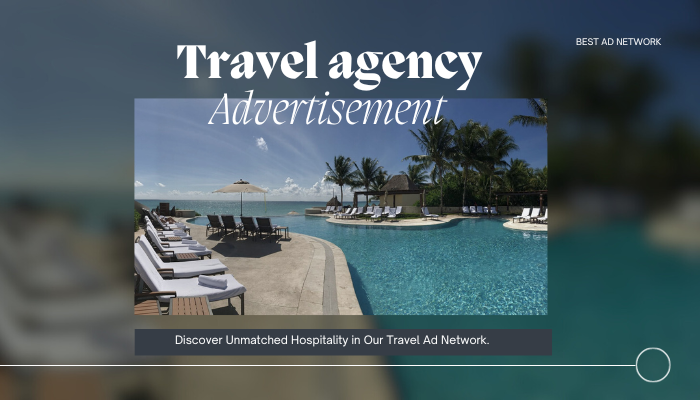Introduction Travel agency marketing refers to the various promotional strategies and campaigns that travel agencies implement to attract new customers and generate more bookings. Unlike large online booking platforms, traditional travel agencies rely heavily on marketing tactics like social media engagement, email campaigns, partnerships, print advertising, and public relations to promote their services and travel products. The goal of travel agency marketing is to highlight the personalized service and expertise they can provide travelers compared to self-service options.

Travel agencies aim to build brand awareness and visibility for their business so that when consumers are planning vacations and trips, they will think of the agency first. Effective
travel agency advertisement requires identifying target audiences and utilizing the right mix of tactics across digital and traditional channels to reach those potential clients. With so many ways to book travel now, travel marketing has to be proactive and strategic with marketing to get their messaging in front of the right people.
Understanding the Travel Advertising LandscapeTravel agency marketing has developed substantially in the digital age. The internet is filled with intriguing travel deals, making it difficult for travel firms to catch the attention of their target audience. Understanding the present situation is critical for making your impact.
- Digital Dominance - Digital advertising now makes up over 60% of total travel ad spend. Mobile, video, and social platforms see significant marketing dollars.
- Targeted Social Ads - Facebook and Instagram enable highly targeted ads to specific demographics and audiences interested in travel. They also facilitate influencer marketing.
- Google Still Crucial - Search ads on Google remain a top way travelers research and find travel products. Google Display Network reaches users worldwide.
- OTA Competition - Major online travel agencies like Expedia and Booking.com run large digital ad campaigns and capture significant market share.
- Visual Content - Captivating photos and videos are key across platforms. User-generated visuals are also influential. Short form video ads gain traction.
Crafting the Perfect Travel AdvertisementThe most effective
travel agency advertisements elicit emotion and showcase unique experiences that will resonate with targeted audiences through breathtaking graphics and motivating yet straightforward content. Ads may transport viewers and stimulate sensations of adventure, relaxation, or enrichment by keeping messages focused on desires and fascinating activities related to the area.
Travel marketers may optimize ad content to catch attention across platforms and drive customers to learn more and book trips by using clear calls to action, multi-channel placement, dynamic flexibility, and rigorous performance analytics. Here's how to do it:
Know Your AudienceThe cornerstone of each successful advertisement is an understanding of your target demographic. Are you attracting adventurers, luxury travelers, or families? Customize your message to appeal to your ideal consumers.
Compelling CopywritingWords matter. Craft a captivating message that evokes emotions, paints a vivid picture of the destination, and highlights the unique experiences you offer. Use compelling storytelling to transport your readers to the location.
Stunning VisualsInvest in high-quality imagery. Showcase the breathtaking landscapes, local culture, and unforgettable moments travelers can expect. Ensure that your visuals are consistent with your brand's identity.
Call to Action (CTA)A powerful CTA is the heart of your advertisement. Encourage your audience to take immediate action, whether it's booking a trip, signing up for a newsletter, or exploring your website.
Utilize Social ProofIncorporate reviews, testimonials, and user-generated content to build trust. Showcasing real experiences from satisfied customers can be a game-changer.
Navigating SEO for Travel AdvertisingOptimizing
travel agency advertisement and marketing for search engines requires extensive keyword research to determine high-traffic phrases travelers use to find vacations online. By including relevant keywords in ad copy and landing pages, travel marketing brands can improve clickthrough rates and search visibility. Creating shareable content that targets keyword terms also boosts organic rankings. Monitoring search analytics provides insight on top-performing search queries to further refine paid and organic SEO strategy. With voice search growing, travel brands must focus SEO on conversational long-tail keywords. By continually optimizing SEO around high-intent travel terms, they can attract qualified traffic through both paid and organic search.. Here are some SEO strategies to boost your visibility for your
travel ads:
Keyword ResearchStart by identifying relevant keywords related to travel and your agency. "
Travel Agency Advertisement" is a great example, and you should integrate it naturally into your content.
Quality ContentSearch engines favor high-quality, informative content. Provide value to your readers by offering insights, travel tips, and destination highlights alongside your advertisement.
Mobile OptimizationEnsure your website and advertisement are mobile-friendly. With more people browsing on smartphones, this step is essential.
The Road to SuccessTo summarize, building a great
travel agency advertisement in 2024 entails understanding your demographic, utilizing SEO, utilizing stunning imagery, and generating captivating text. Your marketing should appeal to your target audience's wants, motivate them to travel, and meet their travel ads demands.
Remember, it's not only about promoting locations; it's also about selling the fantasy of great experiences. By following these techniques and creating your imprint in the travel business, you can make 2024 the year your
travel ad network shines in the world of
travel advertising.